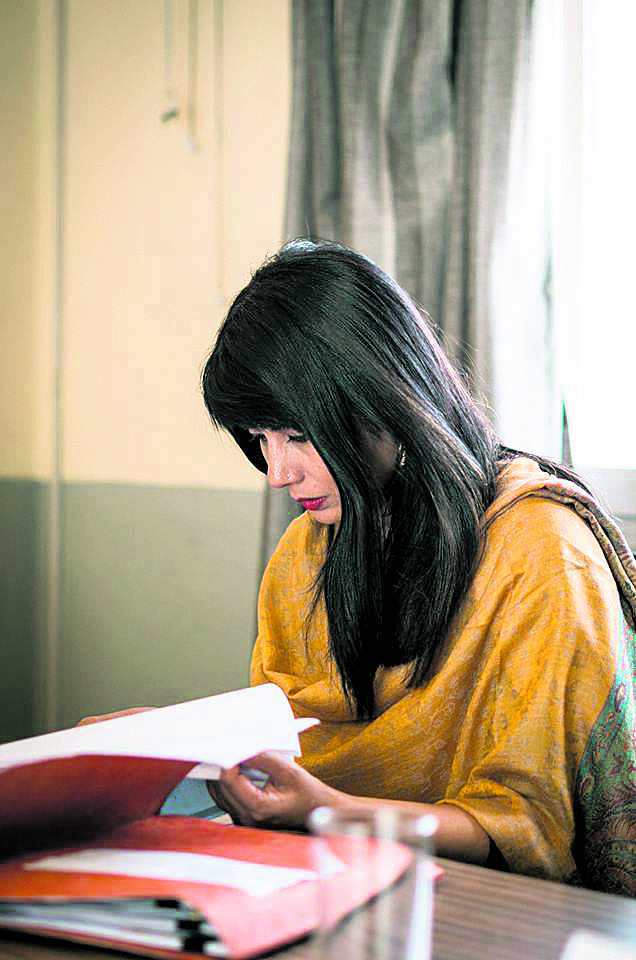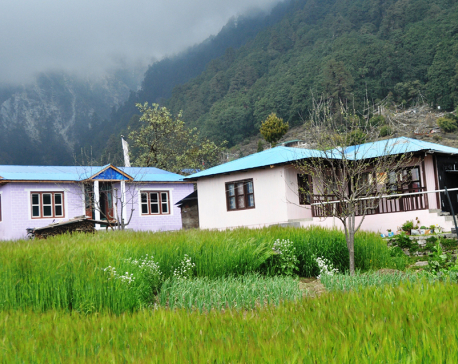
OR
Taking the world of business by storm
Published On: January 11, 2019 09:21 AM NPT By: The Week Bureau

Ever noticed how the term ‘male entrepreneur’ is rarely, if ever, used anywhere. But ‘women entrepreneurs’ is something you hear of quite often. This is perhaps because even in today’s day and age there aren’t enough women business leaders in the world. And that’s true in the context of Nepal as well.
Shyam Badan Shrestha, chairperson of Nepal Knotcraft Center, who launched it in 1984 with the intention of providing employment to women so that they could be economically empowered and self-sustained, believes that the main reason why only few women are employed in our country is because of the society’s perception of women as someone limited to the household and government’s lack of interest in addressing this issue.
“I’ve met a lot of women who are very innovative in their fields of interest and want to work in those fields and develop their skills. But more often than not, they can’t because every time they voice out these thoughts to people close to them, they are shut down immediately and told that a woman’s place is just in the kitchen,” she states before adding that even when a woman’s family is seemingly okay with her working, the responsibility of doing all the household chores and being the responsible family member – who at times has to sacrifice her work or even career to placate any discomfort faced by another member of the family – still falls on her.
Shrestha further claims that she is appalled by the fact that our government is still turning a blind eye to this issue. The executive director of Tara Oriental – a cashmere production and designing company, Mridula Rajbhandari, agrees with Shrestha’s claims and expresses her displeasure at how our society in general is opposed to the idea of women getting jobs and starting their own companies. She reveals that unless the woman herself is very determined and ready to take society’s judgment and hostility head on, she will have a hard time chasing her dreams.
For Bimala Shrestha Pokharel, the biggest challenge she has had to face till date while running Higher Ground Crafts Nepal, a small scale social enterprise that produces handcrafted items like jewelries, bags, slippers, woolen caps, paper cards, etc., are the complex governmental laws regarding import and export of goods. She mentions that since she still isn’t well versed in this matter she is actually planning on hiring a lawyer who can help her maneuver around these laws and carry out her operations properly.
Shrestha Pokharel and Rajbhandari also agree that Nepalis don’t value handcrafted materials much and because the ratio of buyers versus sellers in this market is very disproportioned, this whole line of business in itself is very competitive. Shrestha Pokharel claims that if the women involved in this business have healthy competition among themselves, then it would be easier for everyone to prosper.
Although it seems as though it’s very tough for women entrepreneurs to get far in their careers today, Shrestha reveals that this situation has changed quite a bit when compared to what it was like when she started Nepal Knotcraft Center. Reminiscing of the time, she reveals that back then she had a hard time finding even 25 women to recruit at her firm. Now her organization works in 35 different districts of our country and recruits many women every year.
When questioned what advice they would give to other up and coming women entrepreneurs of Nepal, all three of the women talk about not losing will and focus. While Shrestha emphasizes the importance of being aware of one’s own work and improvement, Shrestha Pokharel talks about how hard work and will always yield good results, and Rajbhandari states that she thinks the most important thing is to give your hundred percent in everything you do. “I say learn to solve your own problems, never depend on anyone else and put your heart and soul into everything you do. If you don’t lose determination to do things you want to, you can overcome anything that comes your way,” she concludes.

You May Like This

Amazon confirms two employees in Italy have contracted coronavirus
WASHINGTON, March 2: Amazon.com Inc said late on Sunday that two employees in Milan, Italy, have contracted the coronavirus and... Read More...

Tourism businesses thrive in quake-hit Melamchighyang
SINDHUPALCHOWK, April 17: After the devastating earthquake of April 2015 shattered his dreams of expanding tourism business, Pemanetup Sherpa of Melamchighyang... Read More...

Attires from around the world
Even today there are thousands of tribes across the world that live among themselves away from the rest of us.... Read More...







Just In
- NRB to provide collateral-free loans to foreign employment seekers
- NEB to publish Grade 12 results next week
- Body handover begins; Relatives remain dissatisfied with insurance, compensation amount
- NC defers its plan to join Koshi govt
- NRB to review microfinance loan interest rate
- 134 dead in floods and landslides since onset of monsoon this year
- Mahakali Irrigation Project sees only 22 percent physical progress in 18 years
- Singapore now holds world's most powerful passport; Nepal stays at 98th











Leave A Comment